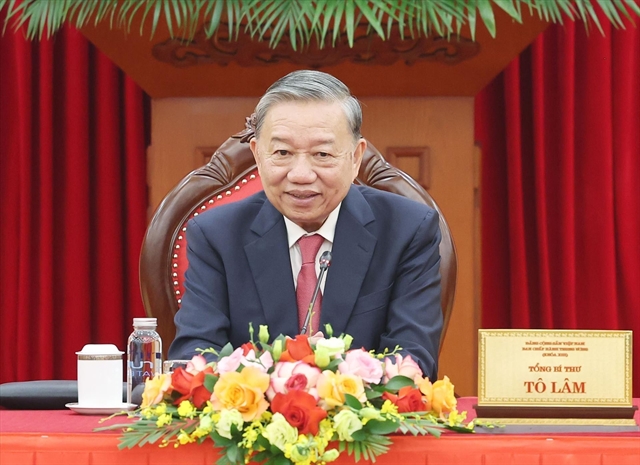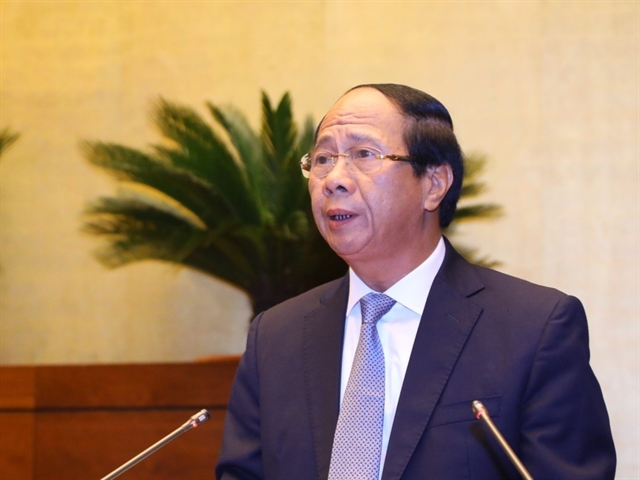 Politics & Law
Politics & Law


|
| Deputy Prime Minister Lê Văn Thành presents the revised Land Law’s draft on Tuesday morning at the fourth session of the 15th National Assembly.—VNA/VNS Photo Văn Điệp |
HÀ NỘI — Amending the Land Law is vital to overcoming its shortcomings and ensuring land resources meet the requirement of development in the future.
Deputy Prime Minister Lê Văn Thành made the statement on behalf of the Government to the National Assembly (NA) on the revised Land Law draft on Tuesday morning at the fourth session of the 15th NA.
The purpose of revising the law was to perfect the land-related legal system in line with the socialist-oriented market economic institution and international integration; resolve overlaps and problems arising from practice; and strengthen land management in terms of area, quality, and economic value to harmonise the rights and interests of the State, land users and investors, he said.
He added that it also aimed to promote the commercialisation of land use rights, develop a healthy real estate market, enhance land resources and motivate the country to become a high-income developed country.
Furthermore, he said it should establish a modern, transparent and effective land management system in association with promoting administrative reform and digital transformation as well as limiting complaints related to land issues.
The draft law consists of 16 chapters and 245 articles. From the original, 28 articles are unchanged; 184 are amended; 41 new articles and eight are abolished.
According to Thành the draft explicitly stipulates the rights and responsibilities of the State; the rights and obligations of citizens regarding land; completes regulations on the rights of land users; and supplements and completes regulations on principles to ensure specificity and regional linkage.
It synchronises and is consistent with construction and urban planning, ensuring the balance between the land use needs of sectors, localities and land potential to use land economically and efficiently.
Moreover, the draft also stipulates specific conditions, criteria and cases in which the State can recover land to implement socio-economic development projects for the national and public benefits (Article 86) and the procedures for compensation, support and resettlement; diversifying forms of compensation; stipulating compensation land price at market price; separating compensation and support payments.
Under the draft, compensation, support and resettlement must be one step ahead before deciding on land recovery.
The draft has added an article (Article 4) to clarify the provisions of the Land Law with other relevant laws.
Thành said that during discussions on the draft, there were still different opinions on expanding the limit for receiving the transfer of agricultural land use rights of households and individuals; expanding recipients of land use rights for rice cultivation; regulations on allowing the transfer, mortgage of "rental rights in land lease contracts with annual payment".
He said these were complex and sensitive issues that directly affected land users' rights and obligations.
Therefore, the Government submitted it to the National Assembly for consideration and comments.
NA's comments
Chairman of the NA's Committee for Economic Affairs Vũ Hồng Thanh said the committee endorsed the need for a comprehensive amendment of the Land Law to ensure full institutionalisation of the Party's guidelines and lines, especially Resolution No. 18-NQ/TW of the Party Central Committee.
Promoting the particularly important role of land resources in socio-economic development; ensuring national defence, security and ecological environment; adapting to climate change; improving the effectiveness of State management in the land sector, and guaranteeing the rights and obligations of land users were all vital.
Thanh said the draft was in line with the guidelines and lines of the Party, by the constitution and compatible with international treaties.
However, as a complex law with a wide impact and attracting great attention of the society, the drafting board was advised to continue reviewing and fully detailing tasks and solutions under Resolution 18 as well as other resolutions and conclusions of the Party, the National Assembly and the National Assembly Standing Committee related to land.
The board also wanted to ensure conformity in regulations on land recovery between the draft and the constitution, considering the compatibility between the draft with other draft laws being considered by the National Assembly.
Some opinions said that the draft had yet to stipulate foreign individuals as land users as well as conditional access to land for foreign organisations and individuals, he said.
Thanh said that foreign land access was complicated with many different opinions.
Resolution 18 also did not mention the content of recognising land use rights for foreign individuals to own houses in Việt Nam or raise the issue of land access for foreign organisations and individuals.
Therefore, it would have to study and evaluate the issue more. It was recommended to consult the competent authorities before making specific provisions in the draft.
In addition, Thanh said it had to ensure a clear distinction between the rights and responsibilities of the State as the representative of the land owner and the rights and obligations of the State as a managerial agency.
It was advised to pay attention to the responsibility of the State on land for ethnic minorities and more clearly define the content of rights and mechanisms for citizens to implement their land rights.
Regarding land acquisition to implement socio-economic development projects for the national and public benefits (Article 86), the committee proposed the draft's compiling board issue more specific conditions and criteria, ensure compliance with the requirements of Resolution 18 and the Constitution, clearly distinguish the nature for the national and public interests to avoid abuse of land recovery and guarantee the legitimate interests of the person whose land is recovered, he said. — VNS